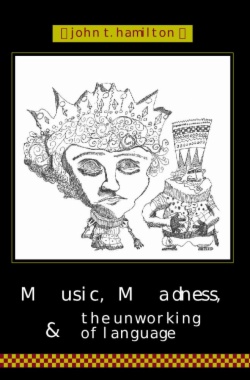In the romantic tradition, music is consistently associated with madness, either as cause or cure. Writers as diverse as Kleist, Hoffmann, and Nietzsche articulated this theme, which in fact reaches back to classical antiquity and continues to resonate in the modern imagination. What John Hamilton investigates in this study is the way literary, philosophical, and psychological treatments of music and madness challenge the limits of representation and thereby create a crisis of language. Special focus is given to the decidedly autobiographical impulse of the late eighteenth and early nineteenth centuries, where musical experience and mental disturbance disrupt the expression of referential thought, illuminating the irreducible aspects of the self before language can work them back into a discursive system.
The study begins in the 1750s with Diderot's Neveu de Rameau, and situates that text in relation to Rousseau's reflections on the voice and the burgeoning discipline of musical aesthetics. Upon tracing the linkage of music and madness that courses through the work of Herder, Hegel, Wackenroder, and Kleist, Hamilton turns his attention to E. T. A. Hoffmann, whose writings of the first decades of the nineteenth century accumulate and qualify the preceding tradition. Throughout, Hamilton considers the particular representations that link music and madness, investigating the underlying motives, preconceptions, and ideological premises that facilitate the association of these two experiences. The gap between sensation and its verbal representation proved especially problematic for romantic writers concerned with the ineffability of selfhood. The author who chose to represent himself necessarily faced problems of language, which invariably compromised the uniqueness that the author wished to express. Music and madness, therefore, unworked the generalizing functions of language and marked a critical limit to linguistic capabilities. While the various conflicts among music, madness, and language questioned the viability of signification, they also raised the possibility of producing meaning beyond significance.
- Contents
- A Note on Translations and Abbreviations
- Hors d’oeuvre I
- Introduction: The Subject of Music and Madness
- 1. Hearing Voices
- Sirens at the Palais Royal
- Between the Infinite and the Infinitesimal
- Excursus: The Howl of Marsys
- Socratic Energy
- 2. Unequal Song
- Music and the Irrational
- Mimesis: Cratylus and the Origin of Language
- Identity and Difference
- Crisis at the Cafe De La Regence
- Satire, Inequality, anf the Individual
- 3. Resounding Sense
- A Break in the Grand Confinement
- The Emergence of the Mad Musician
- Empfindsamkeit
- Hegal's Reading of Le Neveu
- Sentiment De L'Existence
- 4. The Most Violent of the Arts
- The Musical Sublime in Longinus and Burke
- Kant's Abdication
- Community and Herder's Conception of Music
- Wackenroder's Berglinger Novella
- 5. With Arts Unknown Before: Kleist and the Power of Music
- Music, Reflection, and Immediacy in Kleist's Letters
- Die Heilige Cacilie Oder Die Gewalt Der Musik
- Self-Representation
- 6. Before and After Language: Hoffmann
- The Designative and Disclosive Functions of Language: Kreisleriana
- The Uses of Form
- Emptying Out Into Form: Julia Mark and the "Berganza" Dialouge
- Euphony and Discord: "Ritter Gluck"
- Postscriptum: "Rat Krespel"
- Praescriptum: Kater Murr
- Hors d’oeuvre II
- Notes
- Bibliography
- Index

